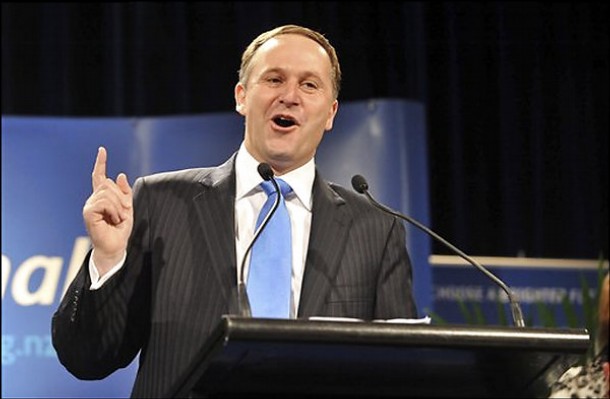No, that prize was the Rugby Union World Cup.
That the victory over France was so welcomed across the country said as much about the torrid last 12 months experienced by many New Zealanders as it did about their attachment to the sport. The effects of two disasters in the South Island were part of that difficult environment. In November 2010 a series of explosions at the Pike River coalmine on the West Coast took the lives of 29 miners. And as 2011 wore on, the Royal Commission’s grim findings told the sad story of this tragedy.
In February, Christchurch was struck by a massive aftershock from the September 2010 earthquake which had caused significant initial damage to New Zealand’s second-largest city. The 2011 event produced one of the country’s worst ever disasters. Nearly 200 lives were lost, and with many of the city’s historic buildings in ruins and many private homes uninhabitable the Key government created a special department to deal with the huge reconstruction effort.
The earthquakes have punched a multi-billion dollar hole in the public purse. These extra expenses would have been difficult to fund in an ordinary year. But 2011 was anything but ordinary. Aside from the continuation of healthy global demand and prices for New Zealand’s dairy exports, the economy was already struggling to recover from the international recession and cope with weak domestic demand. New Zealand’s credit rating was also marked down to AA — an indifferent outcome for a country whose prime minister built his career on the international bond market.
How, then, was Mr Key re-elected in November? Part of the answer lies in the informal tradition which sees newly elected governments often receiving a second three-year term. Part of the answer also lies in the time it has taken the Labour Party to recognise it can govern again even without Helen Clark as its leader. And part of the answer lies in the Prime Minister’s own popularity. At a time when New Zealanders recognise that global economic conditions are so perilous, he is still seen as optimistic and generally unflappable, without being unrealistic.
But Mr Key’s government and the rest of New Zealand face a challenging year ahead. Even if further disasters do not eventuate, the economic outlook remains mixed. Compared to some of its OECD partners in the northern hemisphere, especially in parts of Europe, New Zealand’s situation could be considerably worse. But New Zealanders still have a worrying habit of comparing their lot to their Australian counterparts, and as a consequence many have been heading across the Tasman for some years. But as they come to realise that even the ‘lucky country’ can be affected by slowdowns, and that even China’s mighty economy is not immune from dips in growth, a greater sense of perspective might be dawning.
Regarding foreign policy, the Key government will be hoping that New Zealand’s increasing network of FTAs, especially in Asia, will lead to greater economic resilience. This commercially driven foreign policy has meant, for example, a much greater emphasis on New Zealand’s place in the Trans-Pacific Partnership than in regional arrangements where economic motivations are less evident. Before Christmas, the government also announced that New Zealand’s special forces in Afghanistan would be returning home in early 2012. New Zealanders are not expecting the stationing of American forces on their soil as in Darwin. But their government can expect continuing interest from Washington in a closer relationship — at a time when New Zealand is also seeking to deepen its connections with Asia’s major powers, including China and India, and also with ASEAN.
In 2012 the newly re-elected Key government will be busy administering a very strong dose of the medicine that more-troubled economies are ingesting elsewhere. The public sector cuts which were made before the 2011 election will be redoubled in 2012, with many agencies needing to find savings of up to 20 per cent in their baseline budgets for the next financial year. Whether these cuts will sow the seeds for future problems caused by a lack of government capacity, only time will tell.
Mr Key and his colleagues may also find their wafer-thin majority in the House under threat. The Labour Party has a new leader, and the Green Party, which is heading cleverly toward the political middle ground, has seen its parliamentary representation strengthened as a result. And Winston Peters, the irrepressible comeback kid of New Zealand politics, is back in parliament with a handful of seats. For New Zealand, it certainly looks like an intriguing year ahead.
Robert Ayson is Director at the Centre for Strategic Studies, Victoria University of Wellington.
This is part of a special feature: 2011 in review and the year ahead.

